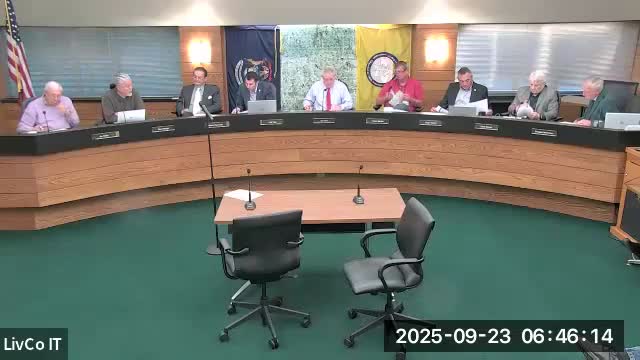Commissioners Debate Financing for Drain Improvements Linked to Howell Racetrack Development
September 24, 2025 | Livingston County, Michigan
This article was created by AI summarizing key points discussed. AI makes mistakes, so for full details and context, please refer to the video of the full meeting. Please report any errors so we can fix them. Report an error »

The Livingston County Board of Commissioners made a significant decision regarding the use of the delinquent tax revolving fund during their meeting on September 22, 2025. The board agreed to an amended resolution that emphasizes their authority over the fund, specifically stating that taxpayer money will not be used for projects benefiting private developers unless those developers are held financially responsible for necessary improvements.
Commissioner Nakagiri highlighted that the board has full discretion over how the delinquent tax revolving fund is utilized, particularly in relation to a drain project linked to a new racetrack development. He stressed that any improvements required for the development should be funded by the developer, not taxpayers. "The intent of the resolution is clear: we will not use taxpayer money unless private citizens are held harmless," Nakagiri stated.
The discussion also touched on the legal implications of the resolution, with concerns raised about potentially circumventing the drain commissioner's authority. The board's attorney, Rich McNulty, indicated that the proposed language could be seen as restrictive and may not align with statutory requirements. This led to a debate about the responsibilities of the developer versus the drain district in funding the necessary improvements.
As the meeting progressed, it became evident that the financial burden of the project would largely fall on the developer and the city, rather than the drain district or taxpayers. The board's decision reflects a commitment to ensuring that public funds are not used to subsidize private development, a move that could set a precedent for future projects in Livingston County.
The resolution is expected to be voted on in the coming weeks, with implications for how similar projects will be financed in the future. The board's stance underscores a growing emphasis on fiscal responsibility and accountability in local government.
Commissioner Nakagiri highlighted that the board has full discretion over how the delinquent tax revolving fund is utilized, particularly in relation to a drain project linked to a new racetrack development. He stressed that any improvements required for the development should be funded by the developer, not taxpayers. "The intent of the resolution is clear: we will not use taxpayer money unless private citizens are held harmless," Nakagiri stated.
The discussion also touched on the legal implications of the resolution, with concerns raised about potentially circumventing the drain commissioner's authority. The board's attorney, Rich McNulty, indicated that the proposed language could be seen as restrictive and may not align with statutory requirements. This led to a debate about the responsibilities of the developer versus the drain district in funding the necessary improvements.
As the meeting progressed, it became evident that the financial burden of the project would largely fall on the developer and the city, rather than the drain district or taxpayers. The board's decision reflects a commitment to ensuring that public funds are not used to subsidize private development, a move that could set a precedent for future projects in Livingston County.
The resolution is expected to be voted on in the coming weeks, with implications for how similar projects will be financed in the future. The board's stance underscores a growing emphasis on fiscal responsibility and accountability in local government.
View full meeting
This article is based on a recent meeting—watch the full video and explore the complete transcript for deeper insights into the discussion.
View full meeting
